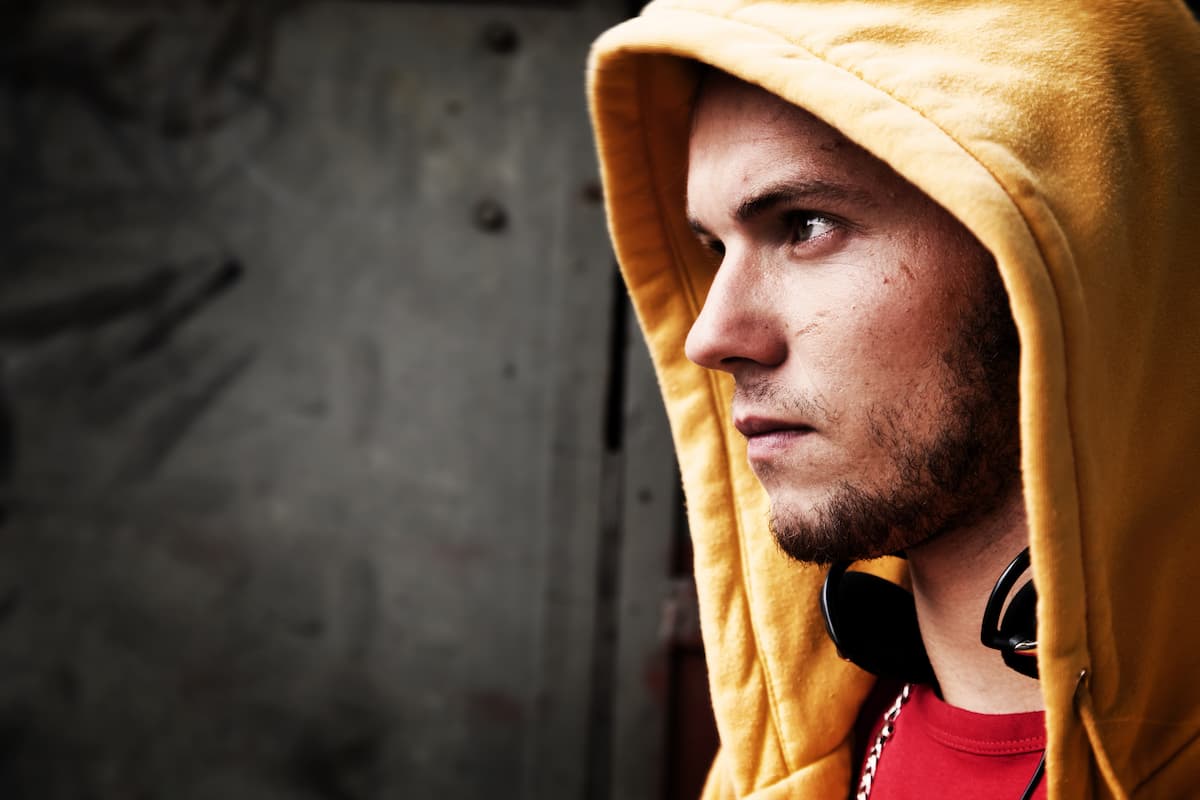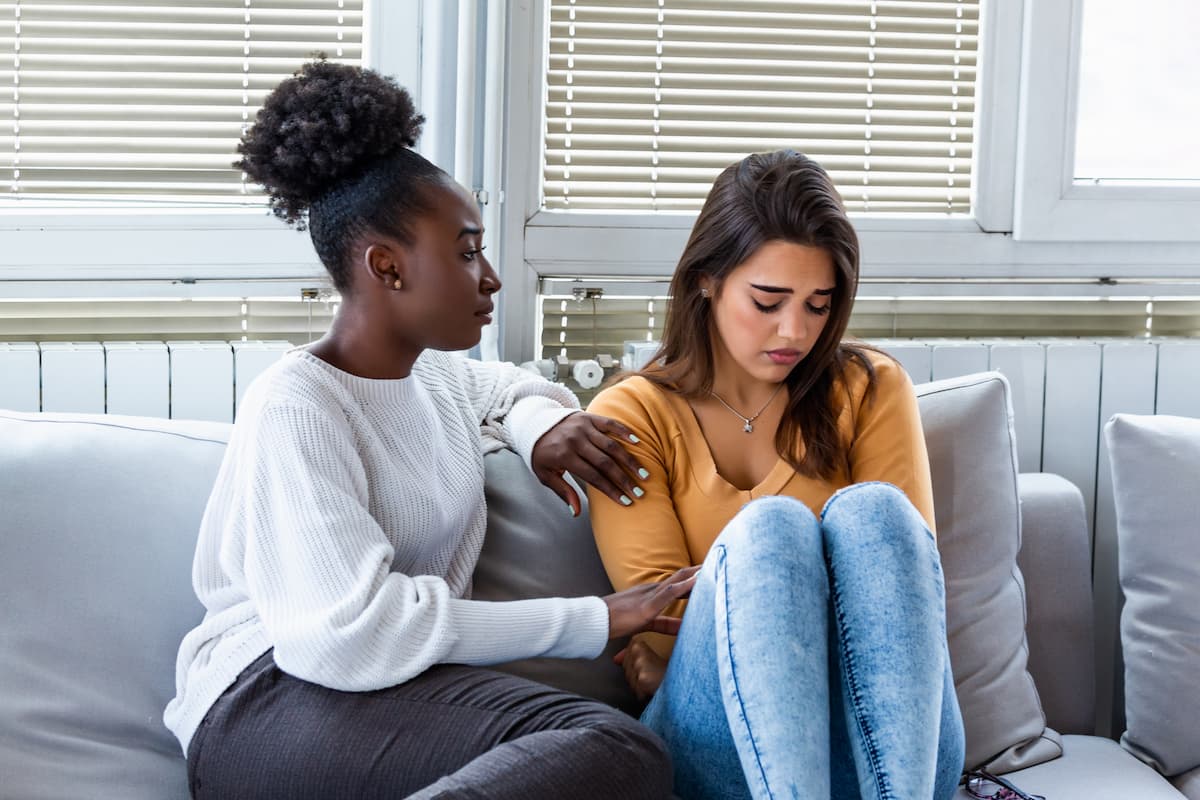Contents
Part 2
Times when your friend might need extra support
Understanding feelings
When someone dies, the people who were close to them may experience all kinds of emotions. These will come and go and change over time and might be mixed together in confusing ways.
Sometimes the feelings brought by grief can be so overwhelming that the person feels like they are going crazy. In the weeks, months and years after somebody dies, your friend might feel…
Numb: No feeling at all. Some families know in advance that their loved one is going to die from cancer. In other families, it will be completely unexpected. Either way, it will likely come as a massive shock when it happens. For a while they might feel empty and distant, like they are looking at their life from space. They might find it hard to believe that the person is really gone and keep expecting them to walk into the room at any minute.
Sadness and despair: Maybe even be worried that they will never feel happy again.
Anxious: Freaked out about what will happen next and how they will possibly get through it.
Angry: At the person who died for leaving them behind; at the adults around them for not telling them more about what was going on; at themselves for not being able to prevent it; or maybe at God or the world for being so unfair.
Relieved: That their parent or sibling doesn’t have to suffer any more, especially if they had been sick and weak for a really long time. Your friend might also be relieved that there will be space in the world for them again, after the attention and energy of their family has been focused on caring for the person with cancer for so long; and relieved that the stress and worry is over.
Guilty: About past arguments or difficult relationships they had with the person who died, or for not getting a chance to say ‘sorry’, ‘thank you’ or ‘goodbye’. Guilt and regret is common, but it’s not always helpful to dwell on past mistakes. Nothing your friend said, did or thought caused their family member to die.
Embarrassed: About how they are acting or feeling in their grief. Or for being different to everyone else now.
Your friend might be the only person they have ever known to experience the death of somebody close and they might worry that their feelings are not normal. But the truth is that there is no right or wrong way to feel.

“I am going to be vulnerable and moody and upset and feeling lost. So please just accept me for how I am and love me no matter how I react or act.”
Everyone grieves differently
Grief affects everyone differently, even when they are grieving over the same person.
Your friend might compare their reaction to the reaction of other people in their family and feel like they are expected to react in a certain way. They might even feel like they have to hide or hold back their grief so they don’t make other people upset.
But you can’t just turn grief off. If you try to bottle it up, it can get stuck and feel even stronger for longer. It’s important that your friend accepts their grief and lets it out in whatever way they need to.
No matter what anyone else says or does, they have the right to:
- Grieve in their own way for as long as it takes.
- Be included in things as much as they want.
- Ask questions about what happened and get honest answers.
- Talk about the person who died.
- Forgive themselves for things they said or did (or didn’t say or do).
- Not try to be strong and brave.
- Not step up to take the place of the person who died.
- Have their own personal beliefs about life and death.
- Make some changes when they are ready and go on having a happy life.
How can I help?
It can be super hard to understand what your friend is going through and to know what help they might need. You may not even be sure whether they want help or special treatment or if you should just try to keep things as normal as possible.
Everyone is different and not everyone will want the same thing. Tell your friend that you want to help and ask them what they need. It can be a comfort just to know you care. Your friend might be feeling really lonely, but they might be afraid to ask for help because they don’t want to burden others with their problems.
Your friend is still the same person, even though they might be moody and acting differently. Make it clear that you will be here for them no matter how they act - whether they want to scream, cry, talk or just laugh and forget about it for a while.

Here are some suggestions by other young people who have lost a loved one to cancer:
In the first few weeks or months: Don’t ignore it. When you find out, acknowledge what has happened. Send a message, leave a voicemail, Facebook them, pop over for a quick hug.
Stay in touch. Check in regularly, even if they don’t always return your calls or messages. Call just to say, “Hi”, forward them funny links, send random texts.
Keep inviting them places even if they tend to turn you down. Keep them in the loop and make it obvious that you haven’t forgotten about them.
Give them an escape. Be a nice distraction. Go to the movies, the gym, play sport, get coffee, anything that will give them a break from the stresses at home.
Be available. Make an agreement that they can just hang out at your place when it gets too much at home, or call at 1am for a chat, no questions asked.
Give them something nice to let them know you’re thinking of them. A letter, a card, flowers, a chocolate bar…
Offer to help in specific ways. Don’t wait for them to ask, they probably won’t. Try to think of practical things you could do – like lifts, babysitting, shopping or picking up assignments from school.
Offer to tell people. So they don’t have to say “My…..died” a thousand times. (But always check first. Your friend might want to tell certain people themselves - or they might not want anyone to know.)
Go to the funeral. Or memorial service to show your support. They might need help organising things, or thanking people after.
Share your memories of their loved one. Your friend will love to hear how loved and respected their parent or sibling was by lots of different people.
Help them collect memories and stories. Anything that reminds your friend of the person who died will become really precious. You could help them make a scrapbook, photo album or memory box full of little knick knacks, tickets, cards and jewellery. You could help them ask neighbours and extended family for their stories and record them on video.
Encourage them to talk about the person who died. A lot of people will be too scared to mention them at all, but sharing memories and stories is important. Don’t feel guilty. That your family isn’t going through something this tough. They won’t be upset or jealous.
“Friends can help by organising events that take the person’s mind off things. My friends and I would organise a dinner get together, go to the cinemas or chill out at someone’s house for the day.”

Further down the track
The next few months and years.
Often people get heaps of support in the first few days and weeks after someone dies, but later on it can seem like everyone has forgotten about it or thinks that they should be ‘over it’ by now. Your friend might find that when the initial shock wears off it really sinks in that someone they love is missing and that they have to start a new chapter of their life without them. Even though it might look from the outside that things are getting back to normal, this is when the pain of grief really hits and your friend might feel more alone than ever.
Don’t forget about it. Continue to check how your friend is going from time to time. Accept that they will still have bad days, even ten years on…
Talk about the person who died. If you knew them, tell your stories. If you didn’t, ask questions.
Let your friend talk about what happened. Let them talk about it a million times if they want. But don’t hassle them to talk if they don’t want to.
Encourage your friend to get out and do things. Don’t let them drop out of life. Hanging out with friends, doing regular activities and having a life separate from the family will give their mind a rest and help to put some structure back into the craziness.
Help create rituals. Rituals are special activities people do to remember someone who died and mark special occasions and anniversaries. These could be formal ceremonies or ones you make up yourself – like lighting a candle, planting a tree, cooking a particular meal or going on a special trip.
Suggest they connect with others in a similar situation. It can be really helpful to talk to people who truly get what it’s like to lose someone close. Canteen provides free events and programs for young people who have lost a parent or sibling to cancer. Visit canteen.org.au for more.
Encourage them to talk to a professional. Counsellors, psychologists and social workers are trained to help people understand their feelings and find solutions to their problems. A parent, family doctor, teacher, nurse or chaplain will be able to help you find one.
Canteen offers free counselling for young people aged 12-25 who have lost a close family member to cancer. Call 1800 226 833 or email [email protected].
Call a helpline. If either you or your friend need to speak to someone right now, about anything at all, call Kids Helpline on 1800 55 1800 or LifeLine on 13 11 14.
Accept that their grief is normal. Don’t make your friend feel like they are acting weird. Remember that grief shows up in people in unique and surprising ways.

Times when your friend might need extra support
Even years later, your friend will have moments when they miss their parent or sibling as much as if they were here yesterday. Some of these moments you might be able to prepare for, like:
- The anniversary of the death, the cancer diagnosis, or the funeral.
- Family events like Christmas, holidays, birthdays, Mother’s Day, Father’s Day.
- Special occasions that highlight the absence of the person who died - like weddings, graduations or the birth of babies.
Try setting a reminder for these dates in your calendar so you can check in with your friend and make sure they’re going OK. Acknowledge how important these days are and let them know it’s OK to be sad if they are.
Other times, memories will be triggered by unexpected everyday things like:
- Seeing, smelling or hearing something that reminds your friend of the person who died.
- Seeing their toothbrush in the bathroom, or the empty seat at the table.
- Someone asking your friend how many siblings they have, or what their parents do.
You can’t stop these ‘bad days’ from happening, or take away the pain they cause your friend. Don’t try to distract them from their feelings. Over time, these moments won’t happen as often or knock them around as much.
“It means so much to me when friends remember Mum’s birthday or the day that Mum died and send me a message to let me know that they are thinking of me.”


















